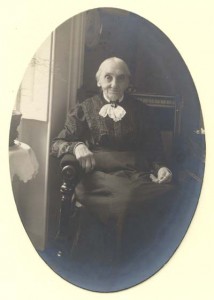 Born February 20, 1823
Born February 20, 1823
Birthplace Westbury, NY
Died 1913
Grave Site Mt. Hope Cemetery, Rochester, NY
Contribution Abolitionist, reformer and women’s rights advocate
Mary Post was born in Westbury (Long Island), New York on February 20, 1823. Her father, Isaac Post, was a Quaker (Society of Friends) farmer who later owned a drugstore. Her mother was Hannah Kirby Post.
While an infant, her parents moved from Long Island to Southern Cayuga County (New York). Her mother died in 1827, and in 1828 her father married Amy Kirby, Hannah Kirby Post’s sister. Both Amy and Isaac Post were abolitionists (people who believed there should be no slavery) and women’s rights activists. Mary Post would maintain their tradition of reform.
The family to Rochester, New York in 1836. In January of 1843, Mary Post married William R. Hallowell (1816-1882), a successful manufacturer. The couple lived on Jones Street in Rochester.
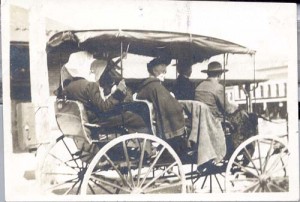 Mary Post Hallowell became an anti-slavery activist as a young woman. In 1842, she joined the newly-formed Western New York Anti-Slavery Society (WNYASS), a group which her parents had helped to found. After she married, her home, like that of her parents, provided a refuge for fugitive slaves as part of the network of the Underground Railroad.
Mary Post Hallowell became an anti-slavery activist as a young woman. In 1842, she joined the newly-formed Western New York Anti-Slavery Society (WNYASS), a group which her parents had helped to found. After she married, her home, like that of her parents, provided a refuge for fugitive slaves as part of the network of the Underground Railroad.
Hallowell was a member of the Genesee Yearly Meeting of the Society of Friends (Quakers). While the ministers and the elders of the Society were against slavery, they nevertheless disapproved of many of the activities of anti-slavery advocates. Hallowell left the Society in the mid-1840s rather than give up her activities, as did her parents and many other Rochester Quakers.
Hallowell and her husband were among the many former Rochester-area Quaker anti-slavery activists who met almost every Sunday at the Anthony farm during the late 1840s and early 1850s. There, they socialized and discussed their views. In addition to being close friends with Susan B. Anthony, Hallowell also brushed shoulders with other nationally-known abolitionists. When the American Anti-Slavery Society decided to hold its annual meeting in Rochester in 1852, she sat on the business committee along with Wendell Phillips and Parker Pillsbury.
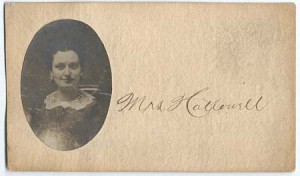 Like many women of her time, Hallowell was also an advocate of temperance. In January, 1852, during a meeting held at Rochester’s Corinthian Hall, she was named an officer of the New York State Women’s Temperance Society (NYSWTS). When the NYSWTS met again in Rochester in June of 1853, she was appointed to serve on the business and the nomination committees.
Like many women of her time, Hallowell was also an advocate of temperance. In January, 1852, during a meeting held at Rochester’s Corinthian Hall, she was named an officer of the New York State Women’s Temperance Society (NYSWTS). When the NYSWTS met again in Rochester in June of 1853, she was appointed to serve on the business and the nomination committees.
Hallowell also assisted in the organization of the United Charities of Rochester. However, more than anything else, women’s rights was the reform activity in which she engaged without ceasing for a period spanning over sixty years. She was present at the first women’s rights Convention held in Seneca Falls in July of 1848 and a signer of the Declaration of Sentiments. She also served as a member of the Arrangements Committee for the Rochester Adjourned Convention held shortly thereafter, on August 2, 1848.
In 1853, Hallowell had a prominent role in a January countywide women’s rights convention and, for a statewide meeting held later that year in Rochester, she signed a call and resolutions entitled “The Just and Equal Rights of Women.” The same year, she encouraged Susan B. Anthony in the latter’s efforts to start a petition drive to extend women’s property rights.
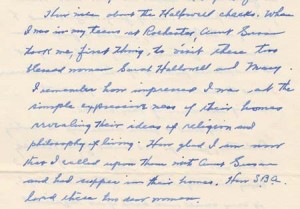 In the aftermath of the Civil War, Hallowell supported revisions to the Fourteenth Amendment that would allow women, as well as African-American men, the right to vote. She attended a convention for this purpose in Rochester at Corinthian Hall in December, 1866. During this period, she also joined Elizabeth Cady Stanton and Anthony’s Equal Rights Association, and when this disbanded she became a member of the National Women’s Suffrage Association (NWSA), also headed by Stanton and Anthony.
In the aftermath of the Civil War, Hallowell supported revisions to the Fourteenth Amendment that would allow women, as well as African-American men, the right to vote. She attended a convention for this purpose in Rochester at Corinthian Hall in December, 1866. During this period, she also joined Elizabeth Cady Stanton and Anthony’s Equal Rights Association, and when this disbanded she became a member of the National Women’s Suffrage Association (NWSA), also headed by Stanton and Anthony.
Hallowell attempted to vote in the presidential election of 1872, but unlike Susan B. Anthony, she was not allowed to register. She and her husband later donated twenty-five dollars toward Anthony’s defense. In 1873, when the Women’s Taxpayers Association was formed — inspired at least in part by Anthony’s arrest for voting – and Hallowell was among its first officers. Five years later, when NWSA held its convention in Rochester to celebrate the thirtieth anniversary of the 1848 Conventions, Hallowell acted as a delegate from Monroe County.
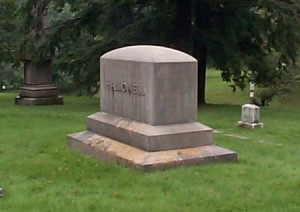 Hallowell’s work for women’s rights continued after she was widowed in 1882. She was present at the founding meeting of Rochester’s Women’s Political Club (later the Political Equality Club) in the Anthony home in December of 1885. During the New York State Women’s Suffrage Association (NYSWSA) meeting of 1905, held in Rochester at the Unitarian Church, Anthony introduced Hallowell as being among the women who had attended the Seneca Falls convention in 1848. In 1906, Hallowell donated $1,000 to the Susan B. Anthony’s Memorial Association, established shortly after Anthony’s death. The goal of this organization was to raise money to build a facility for the use of women students at the University of Rochester.
Hallowell’s work for women’s rights continued after she was widowed in 1882. She was present at the founding meeting of Rochester’s Women’s Political Club (later the Political Equality Club) in the Anthony home in December of 1885. During the New York State Women’s Suffrage Association (NYSWSA) meeting of 1905, held in Rochester at the Unitarian Church, Anthony introduced Hallowell as being among the women who had attended the Seneca Falls convention in 1848. In 1906, Hallowell donated $1,000 to the Susan B. Anthony’s Memorial Association, established shortly after Anthony’s death. The goal of this organization was to raise money to build a facility for the use of women students at the University of Rochester.
Hallowell’s suffrage activities were buttressed by a close personal friendship with Susan B. Anthony. Ida Husted Harper, Anthony’s biographer, describes the “the home of William and Mary Hallowell” as a place where the “doors never were closed” to Anthony, a place
where for more than fifty years she was welcome day or night, where she always turned for advice, assistance and sympathy and ever found them in the fullest measure.
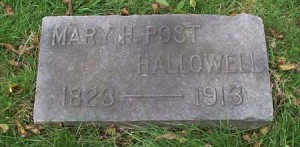 Hallowell was one of twelve friends who shared New Years’ Day dinner with the Anthonys in 1895, and she was one of the few invited for dinner on the occasion of Anthony’s eighty-first birthday in 1901, a birthday upon which Anthony forbade public celebration. In 1904, Hallowell was again one of only twelve women invited to dinner to commemorate the one-hundred-and-eleventh birthday of Susan B. Anthony’s mother in 1904.
Hallowell was one of twelve friends who shared New Years’ Day dinner with the Anthonys in 1895, and she was one of the few invited for dinner on the occasion of Anthony’s eighty-first birthday in 1901, a birthday upon which Anthony forbade public celebration. In 1904, Hallowell was again one of only twelve women invited to dinner to commemorate the one-hundred-and-eleventh birthday of Susan B. Anthony’s mother in 1904.
Bibliography of Suggested Books & Articles
- Harper, Ida Husted, The Life and Work of Susan B. Anthony, Indianapolis and Kansas City, The Bowen-Merrill Company, 1898-1908.
- Hewitt, Nancy A., Women’s Activism and Society Change, Rochester, New York, 1822-1872, Ithaca: Cornell University Press, 1984.
- Lutz, Alma, “Susan B. Anthony and John Brown,” Rochester History, v. XV, No. 3 (July 1953).
- McKelvey, Blake, “Woman’s Rights in Rochester: A Century of Progress,” Rochester History, v. X, Nos. 2 & 3 (July 1948).
- Stanton, Elizabeth Cady, and Ida Husted Harper, et al. History of Woman Suffrage, (various publishers), 1889 – 1922. v. I, II, III, IV, V, VI
Bibliography of Suggested Web Sites